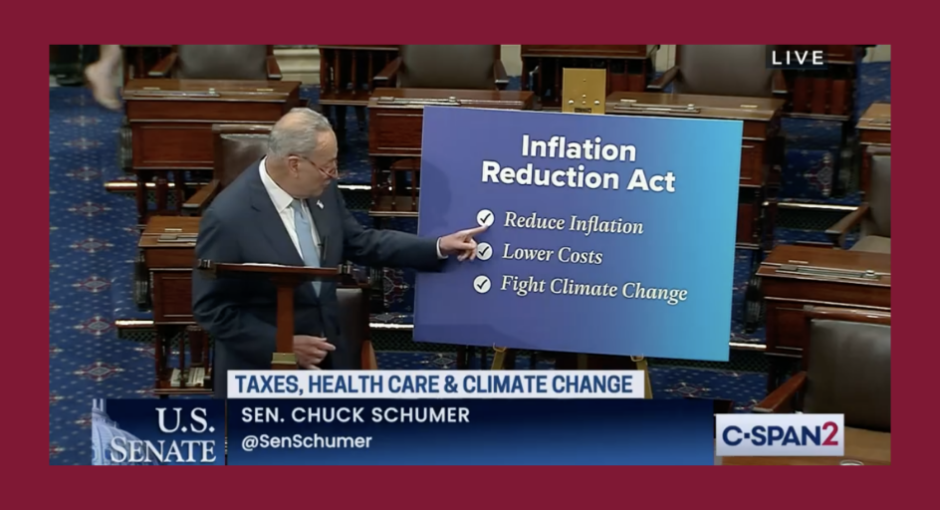The U.S. Senate on Sunday passed historic legislation to let Medicare negotiate the prices of a small number of costly medicines and require drug manufacturers to pay Medicare rebates when prices paid by Medicare rise faster than inflation.
Language in the bill makes it clear that 340B covered entities will be able to access the lower of the 340B price or the negotiated Medicare price, 340B hospital representatives have said.
The Inflation Reduction Act of 2022 (IRA) was passed via the budget reconciliation process, requiring only a simple majority of 50 Democrat votes. Vice President Kamala Harris, as Senate president, provided the tie-breaking vote.
The House is expected to return temporarily from recess to vote on the bill this Friday, according to published reports, with President Joe Biden potentially signing the legislation into law this weekend.
The bill would let the U.S. Department of Health and Human Services negotiate prices of 10 top-selling single-source Part D drugs in 2026, 15 such Part D drugs in 2027, 15 Part D and Part B drugs in 2028, and 20 Part D and Part B drugs in 2029 and later years, according to a Kaiser Family Foundation analysis. The bill’s backers say the negotiating power would result in $288 billion in government savings over time.
Progressive Democrats reluctantly supported the bill but criticized the drug pricing measures as too timid. They pointed out that it would still allow drug manufacturers to determine prices for new drug products and gain protection from competition over a decade.
Senate Republicans were successful in challenging and discarding several popular aspects of the bill by turning to the Senate’s referee, the Senate parliamentarian. Under the Senate’s arcane rules, only certain provisions can be passed by a 50 -vote margin rather than the usual 60-vote margin. As a result, the parliamentarian ruled that the inflation-based drug rebates owed to Medicare could be calculated based on units sold to Medicare but not on units sold in the commercial market. The inflation penalty used in the 340B and Medicaid rebate programs covers all drug prices.
The bill also would cap insulin costs at $35 per month for Medicare patients. A comparable cost cap for privately insured patients fell short of the 60 needed votes, despite the support of seven Republicans.
The defeat marks the second such loss in the last few weeks for proponents of an insulin cost cap in the private market, with a bill introduced in late June, the Improving Needed Safeguards for Users of Lifesaving Insulin Now (INSULIN) Act—co-sponsored by Sens. Jeanne Shaheen (D-N.H.) and Susan Collins (R- Maine)—failing to attract enough GOP support.
Another key provision in the INSULIN Act that supporters hoped might be included in the IRA would have prohibited insurers and pharmacy benefit managers from getting rebates on insulins if manufacturers capped the list price to the 2021 net prices for Medicare Part D or equivalent levels.
The IRA’s other key drug pricing provisions:
- Cap Part D beneficiary total out-of-pocket spending at $2,000 per year
- Cap premium growth at 6% per year through 2029
- Eliminate cost sharing for adult vaccines covered under Medicare Part D
- Expand income eligibility for Medicare Part D low-income subsidies
- Repeals Trump Administration’s drug rebate rule, which required pharmacy benefits managers to pass on saving to patients at point-of-sale
Consumer and some patients groups lauded and the drug industry blasted the Senate’s passage of the bill.
“Make no mistake, this legislation is game changing. It alters the trajectory of drug pricing and policy in the United States,” said David Mitchell, founder of Patients for Affordable Drugs Now, in a statement released Aug. 7. Mitchell’s group is one of the only patient advocacy organizations that does not take funding from special interests such as drug manufacturers, health insurers or hospitals. “It finally begins to break the power of multinational drug corporations to dictate prices of brand name drugs to the American people. It marks a shift to reforming the system in order to make it work for the people it is supposed to serve—rather than the people who profit from it.”
“Today’s vote may feel like a political win for Democrats, but it’s really a tragic loss for patients,” said Pharmaceutical Research and Manufacturers of America President and CEO Stephen J. Ubl in an August 7 statement. “This drug pricing plan is based on a litany of false promises. They say they’re fighting inflation, but the Biden administration’s own data show that prescription medicines are not fueling inflation. They say this is ‘negotiation,’ but the bill gives the government unchecked authority to set the price of medicines.”


